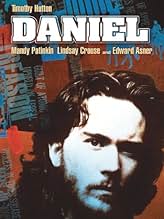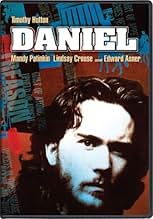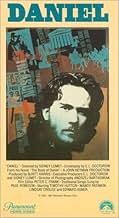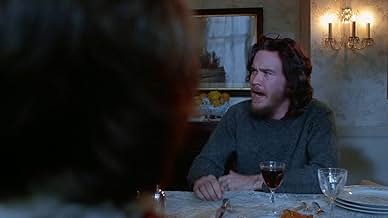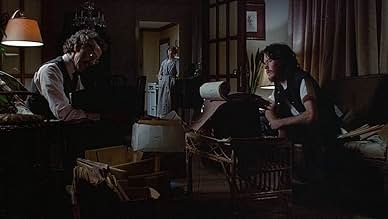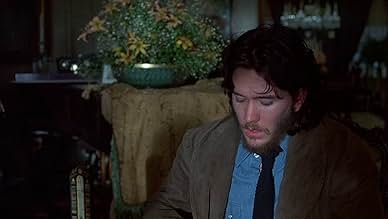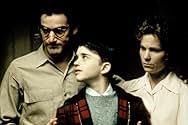CALIFICACIÓN DE IMDb
6.6/10
1.7 k
TU CALIFICACIÓN
Agrega una trama en tu idiomaDaniel Isaacson attempts to determine the true complicity of his parents Paul and Rochelle Isaacson, who were executed for espionage in the 1950s.Daniel Isaacson attempts to determine the true complicity of his parents Paul and Rochelle Isaacson, who were executed for espionage in the 1950s.Daniel Isaacson attempts to determine the true complicity of his parents Paul and Rochelle Isaacson, who were executed for espionage in the 1950s.
Ilan Mitchell-Smith
- Young Daniel
- (as Ilan M. Mitchell-Smith)
Argumento
¿Sabías que…?
- TriviaReportedly, actor Timothy Hutton wanted his part so much he had his agent constantly telephone director Sidney Lumet to organize an interview. Later, Hutton flew to New York at his own cost, met with Lumet, and within twenty minutes had secured the role.
- Citas
Paul Isaacson: If they didn't arrest people, they'd have nothing to do.
- Versiones alternativasNBC edited 33 minutes from this film for its 1987 network television premiere.
- ConexionesFeatured in By Sidney Lumet (2015)
Opinión destacada
DANIEL
"Some day I shall understand"
Some words abouts the complex story. Paul and Rochelle Isaacson (Mandy Patinkin, Lindsay Crouse) were executed in the early 1950s for alleged espionage. Their children Daniel and Susan can't get over this. In the late 1960s, after an attempted suicide of his politically active sister Susan (Amanda Plummer), the rather unpolitical Daniel (Timothy Hutton) tries to find out what exactly happened in the past, tries to understand his parents' lives, tries to help his sister and to get along with his own life...
Sidney Lumet's film "Daniel" (1983) and E.L. Doctorow's novel "The Book of Daniel", which it is based upon, are inspired by the controversial Rosenberg case.
The film shows how children can be affected by the lives of their parents. And it is about the search of one's place in life. Lumet treated these themes again later in his fascinating "Running on Empty" (1988), starring River Phoenix, Christine Lahti and Judd Hirsch. Another theme of "Daniel" is the wish of human beings to understand their parents. Lumet described the movie in a Village Voice interview in the following way: "To me, "Daniel" is the story of a boy who buries himself with his parents, and spends the rest of his life trying to climb out of the grave." The film uses a complex flashback structure to tell its story. "Daniel" illuminates from Daniel Isaacson's view the history of the American left from the 1930s to the late 1960s, including the different left movements. In its criticism of death penalty and McCarthyism, "Daniel" is also a political statement.
Sidney Lumet is one of the great directors of the American cinema. Lumet himself is politically left-leaning, and "Daniel" is probably one of his most personal works. It was about seven years before he got the chance to realize this project. Many people worked on the film for the minimum salary set by the union. Timothy Hutton turned down a million-dollar offer on a film and played Daniel instead for about 25000 dollars.
And Lumet is right when he writes in his informative book "Making Movies": "Despite its critical and financial failure, I think it's one of the best pictures I've ever done." The film proves again Lumet's ability to tell complex, emotionally absorbing, unsentimental stories. Everything works in this uncompromising picture. A few of Lumet's films were marred by their scripts ("The Appointment", "Power", "Family Business", "A Stranger Among Us"). But Doctorow's screenplay for "Daniel" is excellent and extraordinarily multi-layered. Lumet's direction is sensitive and fascinating. Timothy Hutton (who later starred with Nick Nolte and Armand Assante in "Q & A"), Edward Asner (who plays the Isaacson's attorney), Lindsay Crouse (who also appeared in "Prince of the City" and "The Verdict"), Mandy Patinkin, Amanda Plummer and Ilan M. Mitchell-Smith (in the role of the young Daniel in the early 1950s) stand out in a fine cast. The impressive cinematography, which supports the flashback structure by a careful use of color filters, is by Andrzej Bartkowiak, who has worked on 11 Lumet pictures up to now. The rich soundtrack, mainly consisting of songs interpreted by Paul Robeson, perfectly fits and illustrates the film's themes. The editing is excellent as well (a good example is the brilliantly filmed end sequence).
There are many great moments in this film. For instance, there is a powerful rally scene in which you can feel that the Isaacson's children are afraid of the world around them. Another moving scene is a sequence in which young Daniel and young Susan (played by Ilan M. Mitchell-Smith and Jena Greco) walk through New York in search of their home. This scene, also showing Lumet's typically great use of the city of New York, reminded me of Michelangelo Antonioni.
I'm an admirer of Sidney Lumet's cinema. "Daniel" is one of his most underestimated motion pictures, really a must-see. Of course, don't expect standard Hollywood entertainment, but a serious work.
"Some day I shall understand"
Some words abouts the complex story. Paul and Rochelle Isaacson (Mandy Patinkin, Lindsay Crouse) were executed in the early 1950s for alleged espionage. Their children Daniel and Susan can't get over this. In the late 1960s, after an attempted suicide of his politically active sister Susan (Amanda Plummer), the rather unpolitical Daniel (Timothy Hutton) tries to find out what exactly happened in the past, tries to understand his parents' lives, tries to help his sister and to get along with his own life...
Sidney Lumet's film "Daniel" (1983) and E.L. Doctorow's novel "The Book of Daniel", which it is based upon, are inspired by the controversial Rosenberg case.
The film shows how children can be affected by the lives of their parents. And it is about the search of one's place in life. Lumet treated these themes again later in his fascinating "Running on Empty" (1988), starring River Phoenix, Christine Lahti and Judd Hirsch. Another theme of "Daniel" is the wish of human beings to understand their parents. Lumet described the movie in a Village Voice interview in the following way: "To me, "Daniel" is the story of a boy who buries himself with his parents, and spends the rest of his life trying to climb out of the grave." The film uses a complex flashback structure to tell its story. "Daniel" illuminates from Daniel Isaacson's view the history of the American left from the 1930s to the late 1960s, including the different left movements. In its criticism of death penalty and McCarthyism, "Daniel" is also a political statement.
Sidney Lumet is one of the great directors of the American cinema. Lumet himself is politically left-leaning, and "Daniel" is probably one of his most personal works. It was about seven years before he got the chance to realize this project. Many people worked on the film for the minimum salary set by the union. Timothy Hutton turned down a million-dollar offer on a film and played Daniel instead for about 25000 dollars.
And Lumet is right when he writes in his informative book "Making Movies": "Despite its critical and financial failure, I think it's one of the best pictures I've ever done." The film proves again Lumet's ability to tell complex, emotionally absorbing, unsentimental stories. Everything works in this uncompromising picture. A few of Lumet's films were marred by their scripts ("The Appointment", "Power", "Family Business", "A Stranger Among Us"). But Doctorow's screenplay for "Daniel" is excellent and extraordinarily multi-layered. Lumet's direction is sensitive and fascinating. Timothy Hutton (who later starred with Nick Nolte and Armand Assante in "Q & A"), Edward Asner (who plays the Isaacson's attorney), Lindsay Crouse (who also appeared in "Prince of the City" and "The Verdict"), Mandy Patinkin, Amanda Plummer and Ilan M. Mitchell-Smith (in the role of the young Daniel in the early 1950s) stand out in a fine cast. The impressive cinematography, which supports the flashback structure by a careful use of color filters, is by Andrzej Bartkowiak, who has worked on 11 Lumet pictures up to now. The rich soundtrack, mainly consisting of songs interpreted by Paul Robeson, perfectly fits and illustrates the film's themes. The editing is excellent as well (a good example is the brilliantly filmed end sequence).
There are many great moments in this film. For instance, there is a powerful rally scene in which you can feel that the Isaacson's children are afraid of the world around them. Another moving scene is a sequence in which young Daniel and young Susan (played by Ilan M. Mitchell-Smith and Jena Greco) walk through New York in search of their home. This scene, also showing Lumet's typically great use of the city of New York, reminded me of Michelangelo Antonioni.
I'm an admirer of Sidney Lumet's cinema. "Daniel" is one of his most underestimated motion pictures, really a must-see. Of course, don't expect standard Hollywood entertainment, but a serious work.
- Karl1975
- 4 may 1999
- Enlace permanente
Selecciones populares
Inicia sesión para calificar y agrega a la lista de videos para obtener recomendaciones personalizadas
- How long is Daniel?Con tecnología de Alexa
Detalles
Taquilla
- Total en EE. UU. y Canadá
- USD 687,475
- Total a nivel mundial
- USD 687,475
Contribuir a esta página
Sugiere una edición o agrega el contenido que falta

Principales brechas de datos
By what name was Daniel (1983) officially released in India in English?
Responda

